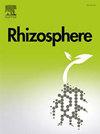椰子树(Cocos nucifera L.)树根菌根生态学:田间影响 AMF 的因素分析
IF 3.4
3区 生物学
Q1 PLANT SCIENCES
引用次数: 0
摘要
本研究是对印度南部喀拉拉邦随机选择的传统椰子田中的丛枝菌根真菌(AMF)多样性进行的首次全面生态分析。考虑到该地区植物、环境和土壤因素(如椰子品种、棕榈健康状况、农业气候区、土壤类型和季节)的变化,我们对 248 个地点的 AMF 多样性、根长定殖百分比(PRLC)和平均孢子密度(MSD)进行了重要分析。共鉴定出七个属(Acaulospora、Archaeospora、Funneliformis、Glomus、Sclerocystis、Septoglomus 和 Scutellospora)的 23 个 AMF 物种,Acaulospora scrobiculata 是所有研究区域的优势物种。对有关变量的多样性指数(包括香农-韦纳指数、辛普森多样性指数和吉尼-辛普森指数)进行的重要分析表明,土壤系列对特定田块的 AMF 多样性有影响。相关分析和主成分分析强调了特定土壤类型与影响 AMF 特性的质量参数之间的相互关系,突出了它们在椰子树生长中的关键作用。研究还揭示了与特定土壤肥力参数相关的本地 AMF 物种的生态幅度。总之,这项研究可作为识别农田中根系和土壤特异性 AMF 的模型,并为利用本土 AMF 物种作为可持续椰子栽培的生态技术工具提供宝贵的生态学见解。本文章由计算机程序翻译,如有差异,请以英文原文为准。
Ecology of arbuscular mycorrhizal association in coconut (Cocos nucifera L.) palms: Analysis of factors influencing AMF in fields
This study is the first thorough ecological analysis of arbuscular mycorrhizal fungal (AMF) diversity in randomly selected traditional coconut fields across Kerala, South India. We conducted a critical analysis of AMF diversity, percentage root length colonization (PRLC), and mean spore density (MSD) across 248 sites, taking into account variations in plant, environmental, and soil factors like coconut varieties, palm health conditions, agroclimatic zones, soil types, and seasons in the region. A total of 23 AMF species from seven genera (Acaulospora, Archaeospora, Funneliformis, Glomus, Sclerocystis, Septoglomus, and Scutellospora) were identified, with Acaulospora scrobiculata being the dominant species in all studied fields. A critical analysis of diversity indices, including the Shannon-Weiner Index, Simpson's diversity index, and Gini-Simpson index, concerning variables indicated that soil series influences AMF diversity in specific fields. Correlational and principal component analyses highlighted the interrelationships between specific soil types and quality parameters affecting AMF characteristics, underscoring their crucial role in coconut palm growth. The study also revealed the ecological amplitudes of indigenous AMF species related to specific soil fertility parameters. Overall, this research serves as a model for identifying root- and soil-specific AMF in agricultural fields and provides valuable ecological insights for utilizing indigenous AMF species as ecotechnological tools for sustainable coconut cultivation.
求助全文
通过发布文献求助,成功后即可免费获取论文全文。
去求助
来源期刊

Rhizosphere
Agricultural and Biological Sciences-Agronomy and Crop Science
CiteScore
5.70
自引率
8.10%
发文量
155
审稿时长
29 days
期刊介绍:
Rhizosphere aims to advance the frontier of our understanding of plant-soil interactions. Rhizosphere is a multidisciplinary journal that publishes research on the interactions between plant roots, soil organisms, nutrients, and water. Except carbon fixation by photosynthesis, plants obtain all other elements primarily from soil through roots.
We are beginning to understand how communications at the rhizosphere, with soil organisms and other plant species, affect root exudates and nutrient uptake. This rapidly evolving subject utilizes molecular biology and genomic tools, food web or community structure manipulations, high performance liquid chromatography, isotopic analysis, diverse spectroscopic analytics, tomography and other microscopy, complex statistical and modeling tools.
 求助内容:
求助内容: 应助结果提醒方式:
应助结果提醒方式:


